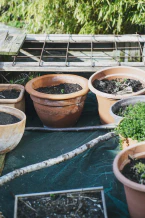Plastics Impact on Poor Communities: A Call for Biomimicry and Zero Waste Production

How Plastic Harms People, Especially Those Living in Poverty
Plastic is a ubiquitous material that has become an integral part of our lives. However, the production, use, and disposal of plastic have severe consequences, especially for people living in poverty. This is a point that is often overlooked in discussions about the harmful impacts of plastic on the planet and other species.
The speaker in the video explains that poor people are the ones who bear the brunt of the plastic crisis. They suffer both at the point of production and use of plastic, and even at the point of disposal. In places like Cancer Alley, where the petrochemical industry turns oil into plastic, people’s lives are shortened, and they suffer from cancer and other health issues.
Moreover, poor people often do not have a choice in the products they use, and they end up ingesting a disproportionate amount of poisonous plastic. They are also the ones who are most affected by the burning of plastic during the recycling process, which releases toxic chemicals into the air and kills people.
It is essential to recognize that the harms of plastic are not limited to the environment; they have real and lasting effects on people’s lives, particularly those living in poverty. As a society, we must work towards a more sustainable future that considers the well-being of all individuals, regardless of their socioeconomic status.
Poor people suffer at the point of production, use, and disposal of plastic
The impact of plastic on the environment and other species is well-known, but the speaker in the video emphasizes that plastic hurts people too, especially poor people. From the production of plastic to its use and disposal, poor people bear the brunt of its negative effects. In places like Cancer Alley, the petrochemical industry turns oil into plastic, and in the process, kills people and shortens the lives of those living in the area. Poor people also suffer at the point of use, where they often have no choice but to buy the cheapest, most dangerous products that contain poisonous plastic. Even at the point of disposal, poor people are disproportionately affected, as plastic often ends up in developing countries where it is burned, releasing toxic chemicals and further harming people’s health. It’s important to recognize the price that poor people pay for the convenience of disposable products and to work towards solutions that benefit everyone, not just those who can afford to make choices.
Recycling of plastic in developing countries often leads to incineration and toxic pollution
The video script highlights that plastic recycling in developing countries often involves incineration, which releases toxic fumes into the environment. These countries lack the resources to implement safe waste disposal methods, so they burn plastic waste as a quick and cheap solution. This practice contributes to air pollution and health problems for the local population. Additionally, many developed countries export their plastic waste to developing countries, which exacerbates the problem. The video suggests that developed countries need to take responsibility for their waste and work towards more sustainable solutions, such as reducing plastic use and investing in safe waste management practices.
Disposability is the root of the problem in our society
In the video, it was emphasized that disposability is the root of the plastic pollution problem in our society. The convenience of single-use plastics has created a culture of disposability where we do not value the resources used to create these products. The desire for convenience has led to an increase in plastic waste that ends up in landfills and oceans.
To tackle the issue of plastic pollution, we need to shift our mindset away from disposability and towards sustainability. We must realize that the convenience of single-use plastics comes at a high cost to the environment and to our health. It is essential to adopt more sustainable practices, such as reusing and recycling, to reduce our dependence on disposable plastics.
Biomimicry, respecting the wisdom of all species, can lead to zero waste production
The speaker in the video mentions the importance of adopting biomimicry as a way to reduce waste and plastic pollution. Biomimicry involves imitating nature’s processes and using them as a model for human activities. By studying the way nature deals with waste, we can learn how to create products that produce no waste at all. The speaker cites examples of how natural systems, such as decomposition and the nutrient cycle, can inspire new and sustainable production methods. She suggests that by respecting the wisdom of all species, we can move towards a zero-waste future.
The Idea of Disposability Corrupts Our Own Society
The speaker in the video argues that the idea of disposability has deeply corrupted our society. We’ve become accustomed to using things once and then throwing them away, without considering the consequences. This mindset has led to a culture of waste, where we prioritize convenience over sustainability.
The speaker suggests that we need to shift our perspective and recognize the value of the resources that we consume. We need to move towards a circular economy, where everything is designed to be reused or repurposed. This requires a fundamental shift in the way we think about products and resources, and a commitment to reducing waste at every stage of production and consumption.
Ultimately, the idea of disposability is not just an environmental issue – it’s a societal issue that requires a collective shift in our mindset and behavior.
We Have a Moral Challenge in This Movement to Rescue Living Beings
The issue of plastic pollution is not just an environmental problem but also a moral one. The production, use, and disposal of plastic have significant impacts on the lives of people, especially those who are living in poverty. The need to tackle this issue is not just about reducing the amount of plastic waste but also about recognizing the value and dignity of all living beings.
As consumers and members of society, we have a moral responsibility to minimize our use of disposable plastic items and to ensure that our actions do not harm the environment or others. By choosing to use reusable items and supporting initiatives that promote sustainable practices, we can take a step towards addressing this challenge.
However, the burden of responsibility should not just fall on individuals. Governments and industries have a role to play in implementing policies and practices that prioritize the well-being of people and the environment. It is important for these entities to recognize the interconnectedness of our world and the impact of their actions on others.
In the end, addressing the issue of plastic pollution requires a collective effort and a shift in mindset. It is not just about reducing waste but also about valuing the lives and well-being of all beings, both human and non-human.
The whole thing is connected: we can hug both trees and children
The speaker emphasizes the interconnectedness of the environment and the people who inhabit it. The problems caused by plastic pollution not only affect the natural world but also have serious consequences for human health, especially for disadvantaged communities. To solve this problem, we need to hug a holistic approach that considers the well-being of all living beings, from trees to children. The speaker suggests that we need to take inspiration from nature and learn from its systems to create sustainable solutions. By understanding and respecting the interdependence of all living beings, we can build a better world for ourselves and future generations.
Conclusion
As we have seen in the different subtopics explored in this post, plastic waste is a complex and multifaceted problem that affects people and the planet. It is especially concerning for poor and marginalized communities who suffer the most at the point of production, use, and disposal of plastic.
Recycling efforts in developing countries often lead to incineration and toxic pollution, highlighting the need for a more sustainable and holistic approach. The root of the problem lies in our society’s idea of disposability, which perpetuates a throwaway culture that harms both the environment and the wellbeing of all living beings.
However, there is hope. By hugging biomimicry and respecting the wisdom of all species, we can move towards zero waste production and a more sustainable future. This requires a moral challenge that goes beyond individual actions and calls for systemic change in our economic and social systems.
Ultimately, we are all connected, and the solution to the plastic waste problem requires a holistic and inclusive approach that considers both trees and children. By working together and recognizing the interconnectedness of all living beings, we can create a world that is truly sustainable and just for everyone.









